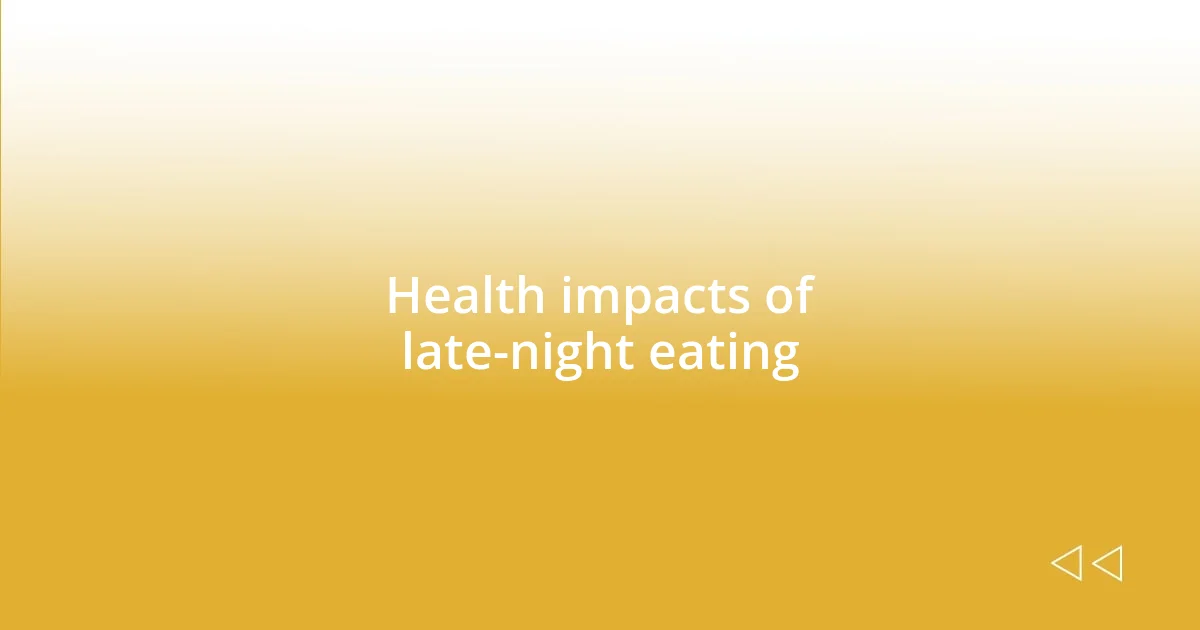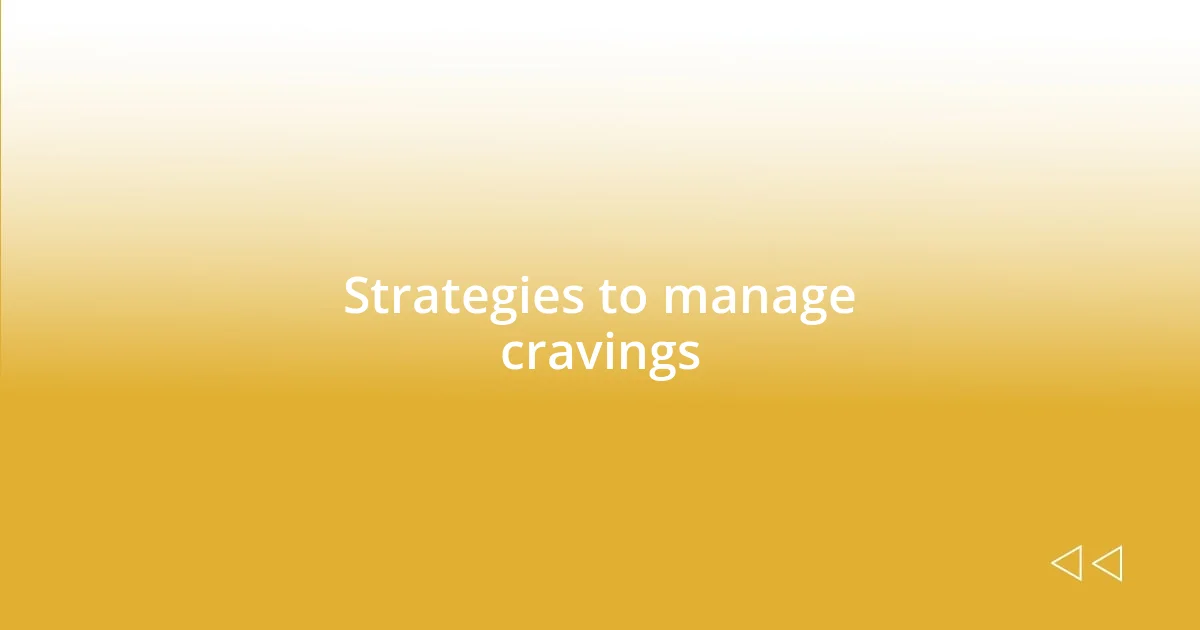Key takeaways:
- Late-night cravings are influenced by emotional states, hormonal changes, and the availability of food, leading to comfort food choices that can disrupt health and sleep.
- Strategies to manage cravings include keeping healthy snacks on hand, practicing mindful eating, and addressing emotional triggers before snacking.
- Swapping traditional late-night snacks for healthier alternatives, planning meals, and creating a sleep-friendly kitchen can enhance nighttime nutrition and reduce unhealthy eating habits.

Understanding late-night cravings
Late-night cravings often stem from a mix of physical and emotional triggers. I remember a night when stress from work drove me to the fridge at midnight, looking for something—anything—to soothe my mind. Why do we always seem to crave comfort food when the world quiets down and our thoughts get louder?
Hormones and our body’s natural rhythms also play a significant role in these cravings. During the night, our body may produce more ghrelin, a hunger hormone, and less leptin, which signals fullness. Have you ever noticed how that sudden urge for a cheeseburger hits just when you’re winding down for bed?
It’s fascinating how our mood influences what we desire late at night. For instance, when I’m feeling a bit down, I gravitate towards the chocolate stash I keep on the top shelf—almost like it whispers to me. Is it really about hunger, or do we seek out familiar flavors to fill an emotional void?

Factors influencing food choices
Food choices, especially those made late at night, are influenced by a mix of external and internal factors. For me, it often comes down to convenience and cravings. One evening, I found myself desiring something salty and crunchy, so I reached for a bag of chips sitting on the counter. It was quick, easy, and the satisfaction was almost immediate. Yet, decisions like these usually bypass my usual mindfulness about nutrition.
Some key factors that steer late-night food choices include:
– Emotional state: Stress or sadness can trigger cravings for certain comfort foods.
– Availability: What’s in the pantry or fridge can strongly influence what I end up eating.
– Habit: Repeating late-night snacks can create a routine, making unhealthy choices feel more normal.
– Social influence: Sometimes, seeing friends or social media posts about food can spark cravings that wouldn’t have occurred otherwise.
I’ve noticed that even the time of day impacts how I perceive my hunger. At night, that yearning for a burger often feels more intense, almost like it has a magnetic pull.

Common late-night food options
Late-night food cravings often lead us to a selection of popular options that seem to call out from the darkness of our kitchens. For many, greasy burgers are a staple; I remember the thrill of biting into a juicy patty while settling in for another late-night binge-watching session. Pizza, too, finds its place in late-night rituals, providing the comfort of warm cheese and crust. The mere thought of these foods can make my mouth water.
Another common choice is glitzy snacks like chips or popcorn. I always find myself gravitating towards these crunchy delights when Netflix is just too good to stop. There’s something about the crunch that feels satisfying, almost like an added layer of comfort to the plot twists unfolding on-screen. Plus, they require no prep—just open the bag, and you’re ready to indulge.
Then there are sweets, effortlessly capturing late-night attention. On particularly stressful evenings, I’ve found solace in a bowl of ice cream, every spoonful easing the weight of the day. It’s as if the cold creaminess of the dessert is designed to melt my worries away. I often wonder if the pull of sugary snacks is stronger at night or if it just feels more innocent when the world outside is asleep.
| Food Option | Why It’s Popular |
|---|---|
| Burgers | Hearty and satisfying; perfect for winding down after a long day. |
| Pizza | Flexible and sharable, making it a fun choice for friends or solo enjoyment. |
| Chips/Popcorn | Quick, crunchy, and require no preparation—ideal for a cozy night in. |
| Sweets (Ice Cream, Chocolate) | Evokes comfort and nostalgia, often chosen during emotional moments. |

Health impacts of late-night eating
Late-night eating can significantly impact overall health, often leaving us feeling sluggish the next day. I still remember my own experience of indulging in a pizza binge at 2 AM only to wake up with a heavy sense of regret and bloating. It’s fascinating how food that brings immediate pleasure can lead to discomfort and disrupt our sleep, making us more irritable and less focused the following day.
Moreover, bingeing on high-calorie foods late at night can interfere with metabolic processes. For a long time, I believed that a night on the couch with snacks was harmless, but research shows that eating close to bedtime can increase the risk of weight gain. I often pondered why my cravings seemed to peak at night; perhaps it’s a combination of circadian rhythms and just my mind seeking comfort after a long day.
Returning to the emotional ties with late-night eating, it’s hard to ignore how these choices can affect mental health as well. During particularly stressful periods, I found myself reaching for snacks not just for hunger, but to numb my anxiety. It begs the question: are we truly hungry, or are we seeking solace in food? The answer often lies in reflecting on our emotional state and recognizing the patterns we create around late-night eating.

Strategies to manage cravings
When those late-night cravings hit, I’ve learned that preparation is essential. I often find keeping healthy snacks on hand, like sliced veggies or yogurt, can divert my attention from fast food temptations. It’s funny how having something nutritious at arm’s reach can make a difference. I find myself thinking, “Do I really want a greasy burger, or would a crunchy carrot stick actually hit the spot?”
Another strategy I’ve embraced is mindful eating. Instead of mindlessly munching away while binge-watching my favorite show, I’ve tried to savor each bite of what I choose to indulge in. The richness of slowly enjoying a small treat can be just as satisfying as a whole pizza, helping me connect more with my cravings rather than just giving in to them. I often ask myself, “Am I eating because I’m hungry or just because it’s there?” That simple pause can shift my perspective.
Lastly, I’ve discovered the value of addressing emotional triggers behind my cravings. Instead of immediately reaching for snacks during stressful moments, I now take a few minutes to breathe, journal, or even take a short walk. This approach not only calms my cravings but allows me to reflect on why I’m feeling the need to snack. I ask myself, “What’s really going on here?” and often find that the urge to eat subsides when I confront my emotions directly. It’s a small change, but it has transformed how I approach those daunting late-night hours.

Healthy alternatives for late-night snacks
I’ve found that swapping out traditional late-night snacks for healthier options can genuinely satisfy cravings without the guilt. For instance, I keep a stash of dark chocolate in my kitchen. Unlike regular candy bars, a couple of squares of dark chocolate can hit the sweet spot while offering antioxidants that my body appreciates, turning a late-night nibble into a mini treat for my health. Have you ever tried it? There’s something about the richness that makes it feel indulgent, yet it doesn’t lead to that heavy feeling the next morning.
Yogurt is another late-night lifesaver for me. When those snack attacks strike, I often reach for a bowl of Greek yogurt topped with fresh fruit or a sprinkle of nuts. It packs protein and probiotics, which help with digestion and make me feel full without going overboard. Plus, the creamy texture feels like a dessert without all the added sugars I’d find in ice cream. I can’t tell you how many times that simple swap has left me satisfied and ready to hit the pillow instead of the fridge again.
I also love making overnight oats as an alternative to heavy late-night meals. The variety of flavors I can create is endless! Just the other night, after a long day, I prepared a bowl with almond milk, chia seeds, and a dash of cinnamon. It’s a soothing, nutritious option that has become my go-to. I ask myself, “Why reach for something unhealthy when I have these delicious choices waiting for me?” These small changes have transformed my late-night habits, showing me that healthy doesn’t have to mean boring.

Tips for better nighttime nutrition
I’ve realized that planning my meals can significantly improve my nighttime nutrition. A few weeks ago, I started incorporating a simple rule: eat a balanced dinner a little earlier to keep me satisfied longer. This change made a huge difference, allowing me to enjoy the evening without the overwhelming urge to snack mindlessly. Have you ever noticed how a well-timed dinner can influence your cravings later?
When those hunger pangs strike, I try to listen to my body instead of automatically reaching for a quick fix. Last month, I experienced a particularly stressful week and noticed I was more tempted to snack. Instead of succumbing, I took a moment to reflect on my feelings and opted for a cozy cup of herbal tea instead. It was incredible how just pausing to identify my emotions made the cravings feel less powerful. What if I told you that sometimes, simply taking a moment to breathe can make the difference between a late-night binge and a peaceful night’s rest?
In my journey towards better nighttime nutrition, I’ve discovered the magic of maintaining a sleep-friendly kitchen. I’ve swapped out foods that promote wakefulness, like sugary snacks, for calming options like almonds or a banana. There’s something about the warmth of a banana or the crunch of nuts that feels nurturing. Since making this shift, I often find myself saying, “Why fight sleep when I can embrace it with something wholesome?” It’s a simple change but has played a vital role in my nighttime routine, making those late hours feel more peaceful and less chaotic.














